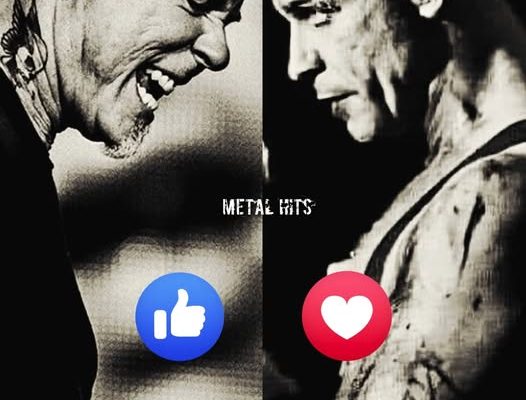James Hetfield 👍 vs Till Lindemann ❤️ – Who Reigns Supreme as Metal’s Most Iconic Frontman?
When it comes to heavy metal, two names stand tall among the greatest frontmen the genre has ever seen: James Hetfield of Metallica and Till Lindemann of Rammstein. Both are titans in their own right, commanding the stage with an intensity that has captivated millions across decades. While they come from different backgrounds and represent distinct styles within metal, the impact they’ve had on the music world is undeniable. Comparing James Hetfield and Till Lindemann is not about discrediting one over the other, but about appreciating how each man has become a symbol of power, presence, and influence in metal history. However, for many fans, especially in recent years, Till Lindemann has emerged as the more unique, theatrical, and emotionally compelling figure. While Hetfield helped create the foundation for modern metal, Lindemann has expanded its boundaries in ways few others could.
James Hetfield, the co-founder, rhythm guitarist, and lead vocalist of Metallica, is the face of thrash metal. His down-picked riffs, aggressive tone, and gruff vocals defined a generation. From Metallica’s early days in the 1980s with albums like Kill ‘Em All, Ride the Lightning, and Master of Puppets, Hetfield’s voice and songwriting helped establish the blueprint for modern metal. He was never just the guy holding the mic—he was the anchor of the band, the driving force behind its sound and direction. With his guitar strapped high, feet wide apart, and his signature growl, Hetfield became a symbol of power and precision. He brought a raw, working-class intensity to the stage, mixing the fury of punk with the precision of metal. His lyrics often dealt with anger, addiction, war, and personal demons—real, relatable themes that made fans feel understood and heard.
On the other hand, Till Lindemann is the embodiment of performance art fused with industrial metal. Where Hetfield brings grit and tradition, Lindemann brings theatre and provocation. Rammstein’s music may be rooted in heavy riffs and pounding rhythms, but it’s elevated by Till’s baritone voice, poetic lyrics, and commanding presence. Lindemann doesn’t just sing—he performs with every inch of his body. His background in theatre and poetry adds a level of sophistication and layered meaning that’s rare in heavy music. Whether reciting dark poetry or standing engulfed in flames, Till transforms every stage into a surreal world that feels both dangerous and hypnotic. His voice isn’t just heard—it’s felt, vibrating with menace, irony, and even sadness. He channels raw emotion through a theatrical lens, and the result is both shocking and profound.
What sets Lindemann apart is his unapologetic commitment to pushing boundaries. While Hetfield once revolutionized metal by making it faster and heavier, Lindemann has challenged the limits of what metal can be thematically, visually, and emotionally. Rammstein’s shows are legendary for their use of fire, controversial symbolism, and haunting imagery. And at the center of it all is Till, whether he’s marching like a machine in “Links 2-3-4” or being “cooked” in a giant cauldron during “Mein Teil.” It’s not just about spectacle—it’s about storytelling, about immersing the audience in a dark and thought-provoking experience. Till’s lyrics, written primarily in German, tackle subjects like desire, power, guilt, and taboo, often forcing listeners to confront uncomfortable truths. Yet despite the language barrier, his messages resonate globally, proving that emotion, energy, and authenticity transcend words.
Hetfield, too, has explored deep and dark places in his music. Songs like “Fade to Black,” “The Unforgiven,” and “One” show a deep emotional core behind the wall of aggression. His struggles with addiction and personal trauma are well-documented, and there’s an honesty in his performances that fans respect and relate to. On stage, James is a leader—he rallies the crowd, feeds off their energy, and gives back tenfold. His connection with the audience is built on trust and shared experience. He’s the voice of a generation that grew up in a world of chaos, and he’s offered both an escape and a battle cry. His longevity and influence can’t be overstated. Without Hetfield, metal wouldn’t be what it is today.
But if Hetfield is the architect of modern metal’s foundation, Till Lindemann is the surrealist painter who turned it into high art. He didn’t follow the traditional rules of rock stardom—he created his own. He stayed true to his language, his culture, and his vision, even when it meant courting controversy or confusion. And instead of backing down, he leaned into the discomfort, using it as a tool to provoke thought and emotion. Where Hetfield’s strength lies in authenticity and musical power, Lindemann’s lies in his ability to transform a performance into a myth. He doesn’t just perform songs—he becomes them, living each moment with such intensity that the line between man and art dissolves.
In terms of vocal style, the contrast is equally striking. Hetfield’s voice is sharp, raspy, and filled with a punk-rooted aggression that shaped the sound of American thrash. His shout of “Yeah!” is iconic in metal culture, and his ability to command attention with even a single syllable is remarkable. Till’s voice, by contrast, is deep, operatic, and often restrained, delivering menace through control rather than volume. He can growl, whisper, chant, and croon, all within the same song. His range isn’t about hitting high notes—it’s about creating atmosphere, tension, and emotional weight. It’s a voice that lingers, like smoke in the air after a fire.
Both frontmen have dealt with immense pressure and have shown resilience in the face of personal and public challenges. Hetfield has openly spoken about his battles with alcoholism, rehab, and mental health, making him a figure of strength and vulnerability. Lindemann, more private and mysterious, has nonetheless faced controversies and criticisms, and yet remains unwavering in his commitment to artistic freedom. Each man has used his pain and struggle not as a weakness but as fuel for creative expression. This is why fans feel so connected to them—not because they are flawless, but because they are human and unafraid to confront what that means.
At the end of the day, the battle between James Hetfield and Till Lindemann is not one that can be won by numbers or awards. It’s a question of presence, influence, and the ability to leave a lasting impression. Hetfield will always be the face of Metallica, a band that helped build the metal genre into a global force. His riffs, his voice, and his legacy are written into the DNA of heavy music. Lindemann, however, has elevated the role of frontman to something almost mythical. He is not just a singer or performer—he is an experience, a provocateur, and an artist who refuses to be defined by anyone else’s standards.
For fans who crave raw aggression, classic riffs, and unfiltered emotion, James Hetfield is the ultimate metal frontman. But for those who seek something more theatrical, poetic, and intellectually provocative, Till Lindemann offers a different kind of power—one that ignites not just the ears, but the mind and the soul. Both men are legends, but in the ever-evolving world of metal, it’s clear that Lindemann has carved out a space that is truly his own. He’s not following in anyone’s footsteps. He’s leaving behind firestorms of his own.



